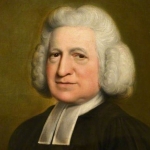Hark! the herald Angels sing,
Glory to the new-born King,
Peace on earth and mercy mild,
God and sinner reconcil’d.
Hark! the herald Angels sing,
Glory to the new-born King.
Joyful all ye nations rise,
Join the triumph of the skies,
With the angelic host proclaim,
Christ is born in Bethlehem.
Hark! the herald Angels sing,
Glory to the new-born King.
Christ by highest heaven ador’d,
Christ the everlasting Lord!
Late in time behold him come,
Offspring of a virgin’s womb.
Hark! the herald Angels sing,
Glory to the new-born King.
Veiled in flesh the Godhead see,
Hail, the incarnate Deity,
Pleased as Man with man to dwell,
Jesus our Immanuel!
Hark! the herald Angels sing,
Glory to the new-born King.
Hail the Heaven-born Prince of peace!
Hail the sun of Righteousness!
Light and life to all he brings,
Risen with healing in his wings.
Hark! the herald Angels sing,
Glory to the new-born King.
Mild he lays his glory by,
Born that man no more may die,
Born to raise the sons of earth,
Born to give them second birth.
Hark! the herald Angels sing,
Glory to the new-born King.




















Comment form: